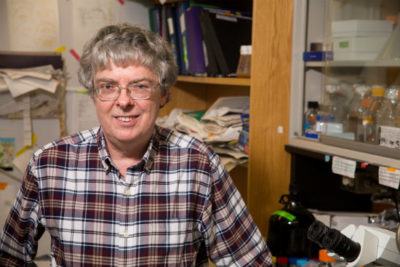Jeffrey Price of School of Biological Sciences studies circadian rhythms
Jeffrey Price, Ph.D., associate professor at the University of Missouri-Kansas City School of Biological Sciences, is an author of two of the seven key publications on circadian rhythms that led up to this year’s Nobel Prize in Medicine.
Research in this field contributes to better understanding of the human biological clock, translating into potential therapies to help people who work night shifts because that disrupts the body’s natural sleep cycle and can alter hormonal and metabolic balance. Studies have associated shift work with high blood pressure, increases in illnesses and injury, mental and emotional strain, and diseases such as diabetes and cancer.
“The biological clock is a powerful force,” said Price, who examines fruit flies, which have 24-hour sleep-wake cycles. “Our research may be applicable also, for example, to patients undergoing chemotherapy. Those experienced with chemotherapy have noticed that drugs have more effect during certain times of day.”
The Nobel committee awarded the prize to Jeffrey C. Hall, 72, retired from Brandeis University in Waltham, Mass.; Michael Rosbash, 73, Brandeis University; and Michael W. Young, 68, Rockefeller University in New York for their discoveries on the molecular mechanisms that control circadian rhythms. Price worked with Young before he joined UMKC in 1999. Here are the two publications Price co-authored:
- Price is the primary author on a 1998 paper published in Cell. The paper mentions Price and Young’s analysis of DBT, the brain chemical that helps trigger the sleep mechanism that is still the focus of Price’s current research. Price and Young worked together for six years from 1989 to 1995 at Rockefeller University.
- Price is second author on another cited paper from 1994, published in Science, about a protein found in the eyes and brain that’s blocked by a chromosome mutation that stops circadian rhythms.
“Dr. Price was a very important part of the research that led to these Nobel Prizes,” said Theodore White, Ph.D., dean of the School of Biological Sciences. “We are proud to have him and his laboratory as an area of active research in the School of Biological Sciences.”
The School of Biological Sciences recently hired Stephane Dissel, Ph.D., assistant professor, who investigates the circadian clock and stress. Other UMKC faculty in other schools also study circadian rhythms.
“Circadian rhythms are a growing and important research area for UMKC,” White said.

